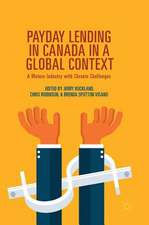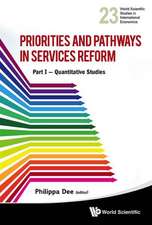Investor Decision-Making and the Role of the Financial Advisor: A Behavioural Finance Approach
Autor Caterina Crucianien Limba Engleză Hardback – 23 noi 2017
This book will be of interest to both behavioural finance scholars and practitioners interested in understanding what the future of financial advisory may have in stock.
Preț: 419.06 lei
Nou
Puncte Express: 629
Preț estimativ în valută:
80.20€ • 87.08$ • 67.37£
80.20€ • 87.08$ • 67.37£
Carte tipărită la comandă
Livrare economică 22 aprilie-06 mai
Preluare comenzi: 021 569.72.76
Specificații
ISBN-13: 9783319682334
ISBN-10: 3319682334
Pagini: 161
Ilustrații: XIII, 161 p. 2 illus. in color.
Dimensiuni: 148 x 210 mm
Greutate: 0.36 kg
Ediția:1st ed. 2017
Editura: Springer International Publishing
Colecția Palgrave Macmillan
Locul publicării:Cham, Switzerland
ISBN-10: 3319682334
Pagini: 161
Ilustrații: XIII, 161 p. 2 illus. in color.
Dimensiuni: 148 x 210 mm
Greutate: 0.36 kg
Ediția:1st ed. 2017
Editura: Springer International Publishing
Colecția Palgrave Macmillan
Locul publicării:Cham, Switzerland
Cuprins
Chapter 1: Understanding financial biases.- Chapter 2: Addressing financial biases.- Chapter 3: Financial advisory: basic roles and functions.- Chapter 4: Financial advisory: normative developments and incentives.- Chapter 5: Behavioural financial advisory: taking stock and taking it to the field.- Chapter 6: Conclusions.
Notă biografică
Caterina Cruciani holds a PhD in Economics from Ca’ Foscari University of Venice, Italy, where she is currently Postdoctoral Researcher. She is also Operating Director and member of the Center for Experimental Research in Management and Economics (CERME) at Ca’ Foscari University of Venice. Her research focuses on financial institutions, financial advisory, the determinants of trust in the client-advisor relationships, and behavioural finance. Caterina has taught Behavioural Economics at graduate level and Corporate Finance at undergraduate level, alongside an introductory course in Behavioural Finance offered to top professional financial advisors. Her publications are featured in international journals like the Journal of Economic Interaction and Coordination.
Textul de pe ultima copertă
This book looks at financial advisory from a behavioural perspective, and focuses on how the nature of the relationship between advisors and clients may affect the ability of the advisor to perform its functions. Broken into three key parts, the book looks at the client, the advisor, and the relationship between thw two. Chapters review relevant theories of decision-making under risk to understand the nature of clients’ decisions. The literature on advisors’ functions and the normative landscape regulating financial advisory are also addressed. Finally, this book reviews how behavioural finance has traditionally addressed portfolio selection and explains how trust can be seen as a viable avenue to maximize advisors’ effectiveness and pursue clients’ needs.
This book will be of interest to both behavioural finance scholars and practitioners interested in understanding what the future of financial advisory may have in stock.
This book will be of interest to both behavioural finance scholars and practitioners interested in understanding what the future of financial advisory may have in stock.
Caracteristici
Outlines concepts that characterize behavioural finance Brings together recent strands of literature and combines new evidence emerging from both theoretical and experimental analyses Suggests a relation-based approach to asset management























